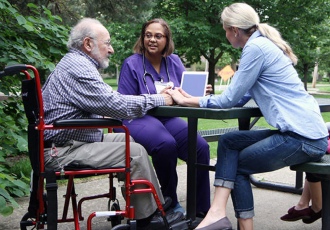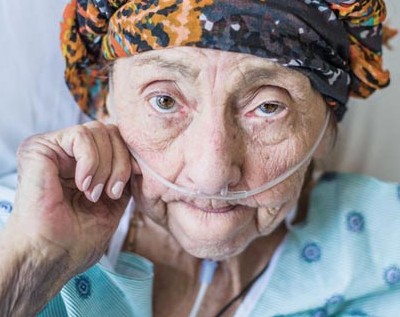Hospice and Palliative Care Are Needed for Both Dementia Patients and Their Caregivers
The symptom management and support provided by palliative care are important for preventing and relieving suffering for family caregivers and patients with dementia, according to an American Journal of Geriatric Psychiatry article by psychiatry, geriatrics, and palliative medicine specialists.
The authors call dementia “a life-altering illness for families and a life-limiting illness for patients.”
They intend their article to assist clinicians in applying key elements of palliative principles in the care of their dementia patients, and to encourage the “use of both palliative care and hospice services as an extra layer of support for the providers, patient, and family, preferably sooner in the disease course rather than later.”
Elements of an approach to managing neuropsychiatric symptoms include:
- Whole-person care
- Accurate diagnosis
- Categorization of symptoms and behavior
- Nonpharmacologic interventions
- Clear communication regarding the use of any psychoactive medications
- “Care for the patient and family across all domains of potential suffering”
The authors also stress the importance of pain assessment and advance care planning in the care of patients with dementia, as supported by the American Academy of Neurology’s updated 2017 Dementia Management Measurement set.
Depression in Partner Caregivers of Dementia Patients Increases Over Time
Older adult caregivers of their spouses/partners with Alzheimer’s disease and related dementias (ADRDs) report a higher number of depressive symptoms than their cohorts whose partners do not have dementia, and these depressive symptoms increase over their years of caregiving, according to a study in the Journal of Applied Gerontology.
Investigators analyzed data collected by the National Institute on Aging’s Health and Retirement Study in two-year increments from 2000 to 2014 on a nationally representative sample of 16,650 respondents aged ≥ 51 years (mean age, 65.6 years) and their partners.
Key Findings
- Compared with respondents whose partners had no ADRD, respondents with partners diagnosed with ADRD had a 30% increase in reported depressive symptoms from baseline to follow-up.
- Respondents whose ADRD partners were diagnosed within 2 years showed a 27% increase in depressive symptoms.
- Those whose partners were diagnosed more than 2 years ago reported a 33% increase in depressive symptoms.
“In all, the effects of an ADRD diagnosis are sizable and grow over time,” write the authors. Substantial research has identified “shared trajectories of health” among older adult dyads, including dementia caregivers and their care recipients, they note. The growing emotional cost of helping a partner with a progressive disease such as dementia reinforces the need to “‘care for the caregiver’ as behavioral and care needs exacerbate over time.”
Sources:
Irwin, S., Shega, J., & Sachs, G. (2018). The Importance of Palliative Care for Dementia. American Journal of Geriatric Psychiatry, 26(2):235-237; DOI: 10.1016/j.jagp.2017.08.010.
Harris, M., Titler, M., & Hoffman, G. (2020). Associations Between Alzheimer’s Disease and Related Dementias and Depressive Symptoms of Partner Caregivers. Journal of Applied Gerontology, Epub ahead of print, DOI: 10.1177/0733464820952252.

Tips for Effective Goals-of-Care Discussions
Conduct more effective goals-of-care discussions with your patients by using this conversation starter guide.
Download Now Clinicians: Receive Our Newsletters
